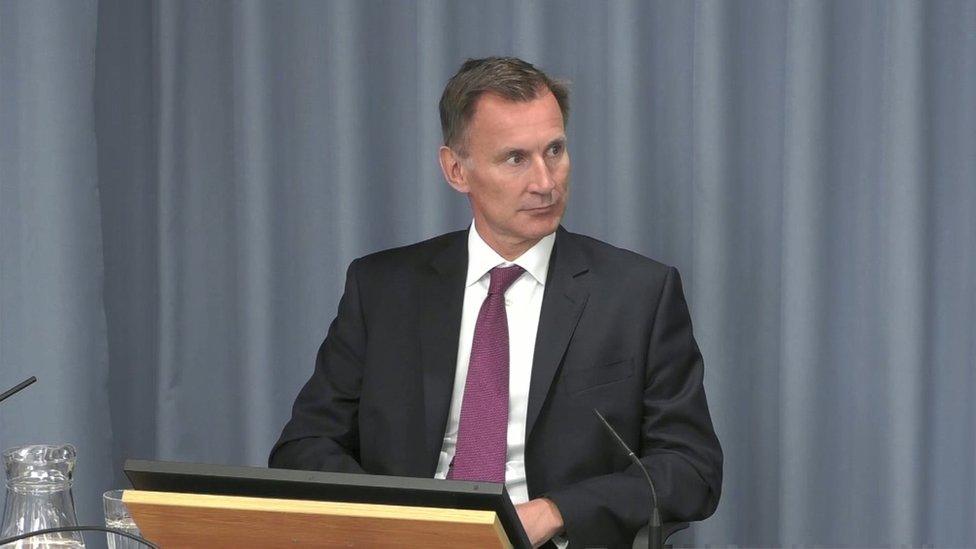Jeremy Hunt calls contaminated-blood scandal a huge failing of democracy
- Published

Former Health Secretary Jeremy Hunt has told a public inquiry institutions and the state can sometimes "close ranks around a lie".
Giving evidence at the infected-blood inquiry, he said it could be seen as a "huge failing of democracy" that victims had waited so long for justice.
At least 5,000 people contracted HIV or hepatitis C in the 1970s and 80s, after being given contaminated blood products and transfusions on the NHS.
More than 2,400 have died as a result.
Jenni Richards QC asked whether a 2012 briefing for new ministers in the health department - "almost certainly" not shown to Mr Hunt at the time - stating, under a heading "Key facts", hepatitis C and HIV (Human Immunodeficiency Virus) infection had been a problem in the 1970s and 80s, "before it was possible to screen donors and make products safer", suggested the contamination had been an "unavoidable problem".
Mr Hunt, health secretary for six years until July 2018, replied: "I mean, that briefing is wrong and it shouldn't say that.
"At the very least, ministers should be aware as politicians that this is contentious and disputed by families - but I'm afraid it tries to suggest the issue is closed when it is not."
He described a situation in the civil service and government where "people collectively try and remember things as they would like them to have been, rather than as they actually were."
The language used in documents suggested an "institutional closing of ranks" that tried to protect people perceived to be "doing the right thing", Mr hunt said.
"I am afraid that institutions and the state close ranks around a lie, sometimes, and I think that is what happened in this case," he said.
'Pressure on'
The inquiry, chaired by former judge Sir Brian Langstaff, started taking evidence in April 2019, with hearings in Belfast, Leeds, Cardiff, Edinburgh and London.
It is expected to publish its final report in mid-2023.
Later in the afternoon, Mr Hunt paid tribute to campaigners and families of those infected, including his constituent Mike Dorricott, who died in 2015 from liver cancer linked to the hepatitis C he contracted.
"In some ways you could look at this as a huge failing of our democracy, that it's taken so long to resolve this issue," he said.
"In another way, the families and campaigners, including Mike, were entirely responsible for justice being done in the end, by the way they campaigned, by the way they put pressure on all of us in Parliament and created that moment in which the public inquiry should happen."
Related topics
- Published28 July 2021